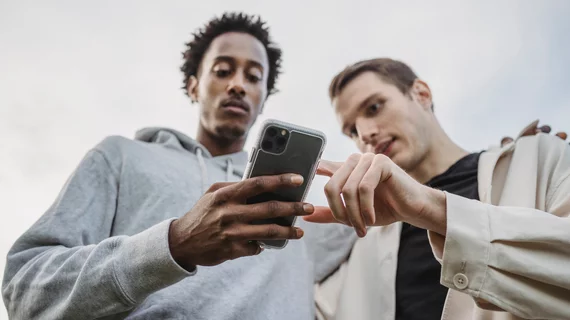Going head-to-head against a small group of clinicians in 50 care episodes, an AI-based smartphone app has equaled or bested the humans at triaging patients to the most appropriate site of care.
The clinicians were seven ER physicians, five internal-medicine specialists and a handful of physician assistants from various specialties.
The care episodes were verbal vignettes (example: A 25-year-old man with severe shortness of breath for a few hours. The symptoms started after a motor vehicle accident in which he was the driver of the car involved. He also complains of chest pain).
For each scenario, the researchers asked the clinicians and the app to present the patient with one of four directives:
- “Go to an ER or call 911 (life-threatening injuries or symptoms that need immediate treatment)”
- “Go to urgent care [e.g., a walk-in clinic] within 24 hours (non-life-threatening but need treatment”
- “Go to primary care physician (PCP) within three days (not immediately life-threatening and can wait three days before being seen by a primary care physician or specialist)”
- “Self-care, remain at home and only report to primary care or urgent care if the condition worsens”
The researchers conducted the experiment in several phases to test the app against individual clinicians as well as against consensus decisions made by five MD hospitalists specialized in internal medicine at a major academic medical center.
In one of the consensus rounds, triage decisions made by individual clinicians matched the consensus call 80% of the time (40 of 50 cases). The app did even better, agreeing with the expert consensus at an 88% clip (44 of 50 cases).
Another consensus round brought back similar results.
The study was led by hospitalist Sean Delshad, MD, MBA, of the Geffen medical school at UCLA, with substantial input from fellow hospitalists Venkata Dontaraju, MD, of Javon Bea Hospital in Illinois and Vipindas Chengat, MD, of Mountainview Medical Center in Las Vegas.
The authors acknowledge several limitations in study design, including the use of vignettes rather than real-world situations.
However, they assert, their findings have significant implications:
The utilization of AI-based applications that improve the appropriateness and safety of medical triage has the potential to improve patient outcomes and experience as well as the efficiency of healthcare delivery. Payers, providers and patients may benefit from cost savings and higher-value care. AI-based applications may also be able to provide triage assistance in more rural or underserved areas where access to traditional triage nursing services may be limited.”
The app used in the study was MayaMD, in which two of the three authors maintain a financial stake.
The study is posted in Cureus, which is offering it in full for free.

